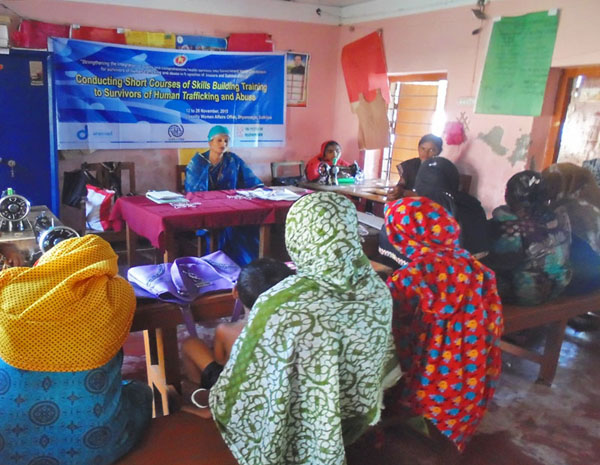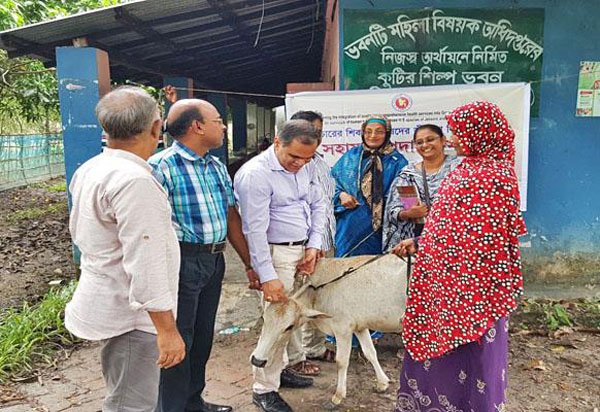Moyna Begum, a 32-year old single mother of three children, migrated to Abu Dhabi in search of a better life. What awaited her in this new journey, she considered endlessly.
All seemed well until she arrived at her new workplace. She was made to work as household help, in stark contrast to the job she was promised prior to leaving Bangladesh. “They seized my passport and my movement was restricted. I could not communicate with anyone back home. My dream of a good life was shattered,” Moyna’s voice trailed off as she recalled her nightmare. At that moment, Moyna began her journey of becoming one of the '21 million' estimated by the International Labour Organization (ILO) to be victims of forced labour.
Over 118,088 Bangladeshi women worked abroad as migrant workers in 2016, with nearly all (99%) of them working in the Middle East. Looking at a wider time span, a total of 574,075 Bangladeshi women worked as migrant workers since 1991. These represent women who went through the regular migration channels. Thus, the actual corresponding numbers, inclusive of women who went through irregular channels, must be much higher. A vast majority of Bangladeshi female migrant workers work in low-skilled occupations, with the countries of Gulf Cooperation Council (GCC) offering the largest labour markets for these jobs.
Only after a year working for her abusive employer did Moyna manage to escape, through contacting a fellow Bangladeshi working in Abu Dhabi. It took another three months before she was able to return home. Yet, the woman that returned home was no longer the same Moyna – she was devastated, insecure, physically drained, and mentally wiped out from such a harrowing ordeal.
While noteworthy progress has been made in combatting human trafficking globally, the health rights and protection services of trafficking survivors are still inadequately addressed. Bangladesh remains both a source and transit destination for human trafficking, with border areas most affected. Although many initiatives to prevent trafficking have been launched, access to health and psychosocial services features minimally in national efforts.
Upon Moyna’s return, this unfortunate reality hit her hard. This same reality hit many other victims of trafficking, including Monira Begum, who was trafficked into a sex brothel in India at 23 years of age. “My daughter couldn’t sleep for months,” Monira’s father recollects. “She wouldn’t take any food or say a word. Her physical injuries and mental agony were both severe.” Both Moyna and Monira lost their confidence and avoided socializing out of fear that others would discover what had happened to them.

Participants are trained in tailoring. Photo: Rupantar, 2015.
Thankfully, the two were reached out to and offered support by the Community Coordination Team (CCT). Comprised of community leaders, the group was formed under a project that aimed to strengthen quality healthcare services for survivors of human trafficking and abuse. The project was implemented in six upazilas (sub-districts) by IOM Bangladesh, in partnership with local NGO Rupantar and with funding support from the Anesvad Foundation.
Through the project’s pilot, IOM ascertained that, indeed, two of the greatest barriers to accessing healthcare facilities were social stigma and economic circumstances. It was discovered that current infrastructure was not fully equipped to deal with survivors of physical trauma and injuries from torture, hormone injections, and substance abuse. Endemic non-communicable diseases (such as hypertension, arthritis, and diabetes) and mental illnesses (such as depression, anxiety, and post-traumatic stress disorder) were also common among survivors.
As a first response, medical equipment and supplies at government health facilities were upgraded, the capacity of healthcare providers was enhanced through trainings, and community support groups and referral networks were formed. “[The project] helped me get a referral health card, allowing me to receive necessary medical care from the local health complex. Slowly, but surely, I recovered,” says Monira.

IOM Bangladesh Chief of Mission Sarat Dash hands over a cow to a survivor of trafficking in Jessore district. Photo: IOM, 2016.
Emphasizing the need to provide socioeconomic rehabilitation services, IOM provided short courses on skills such as tailoring, poultry rearing, and small business entrepreneurship to 60 participants, beginning September 2016. Moyna received a box of cosmetic items worth BDT 15,000 (USD 190) to start a small business, using the profit to purchase a goat and five chicks. “The herd has grown to three goats and 18 hens. My children are going to school,” says Moyna. “My migration venture failed, but my dreams did not.”
Monira, on the other hand, was part of a group of survivors that received skills development training, with additional support provided in the form of cloth, sewing machines, rickshaw vans, poultry, and domestic animals. Monira used her newly acquired skills to open a home-based tailoring business. “The business earnings have grown over time. I can now live with dignity and raise my children with care,” Monira observes.
Aside from working with local partners on social reintegration and economic rehabilitation for victims, IOM works closely with the Ministry of Home Affairs (MoFA) and border management authorities of the Government of Bangladesh to strengthen their capacities in combating human trafficking. IOM also managed projects with a specific focus on counter-trafficking.
Overall, IOM’s psychosocial and socioeconomic support is enhancing self-esteem, dignity, and empowerment among human trafficking survivors – especially women, who represent around 90% of victims, according to the project’s data. As a result, survivors of human trafficking have a higher chance of social reintegration and improving their social wellbeing, as evidenced in Moyna’s and Monira’s ability to turn their lives around. “I have survived the ordeal, and that gives me confidence that I can deal with whatever life throws at me,” says Moyna with hope in her eyes.
Dr. Samir Kumar Howlader is a National Programme Officer (Migration Health) at IOM Bangladesh.